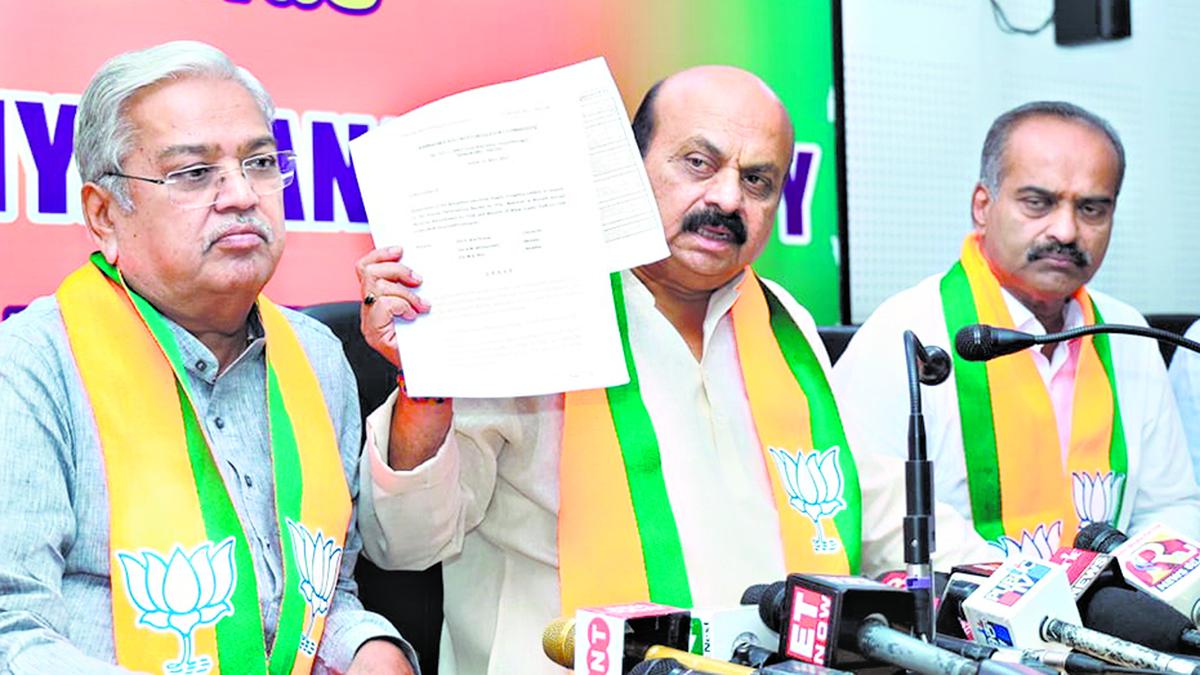BJP leaders Basavaraj Bommai , Govind Karjol, and P.C. Mohan address a press conference. Photo: Special Arrangement
All the political parties in Karnataka have completed the process of ticket distribution for the 28 Lok Sabha constituencies. The announcement of candidates has led to internal churning in both the ruling Congress and the Opposition Bharatiya Janata Party (BJP), although the problems are more pronounced in the BJP.
The BJP, which has 25 MPs and prides itself on the discipline of its cadre, is trying to quell dissidence in more than half a dozen constituencies. The Congress, which has just one MP from Karnataka, is busy dealing with discord in Kolar and Bagalkot.
In the most recent instance, the BJP’s choice of candidate for the Chitradurga constituency in central Karnataka has become a problem. The party nominated former Minister Govind Karjol, a trusted aide of party veteran and former Chief Minister B.S. Yediyurappa, to contest the seat. Mr. Karjol, who was defeated in the last Assembly election, is seen as an “outsider” since he hails from Bagalkot district in north Karnataka. His candidature has upset the party’s Holalkere legislator, M. Chandrappa, and his son, Raghunandan, who was hoping for a ticket.
In Shivamogga in the hilly Malnad region, BJP veteran leader K.S. Eshwarappa announced his candidature as an independent. This is where Mr. Yediyurappa’s son and incumbent MP B.Y. Raghavendra is contesting. Mr. Eshwarappa took this decision after the party refused nomination for his son K.E. Kantesh from the Haveri Lok Sabha seat for which he has blamed Mr. Yediyurappa.
After denying six-time MP Ananth Kumar Hegde re-nomination, the BJP has been struggling to convince him to support former Speaker and Minister Vishweshwar Hegde Kageri, who has been named as the candidate from Uttara Kannada in the coastal belt.
In Dharwad in north Karnataka, a Veerashaiva-Lingayat dominated constituency, Union Minister Pralhad Joshi is facing a different problem. Several seers from the community have demanded that the BJP replace him, alleging that Mr. Joshi harbours “anti-Veerashaiva/Lingayat” sentiments. The powerful Akhila Bharatha Veerashaiva Mahasabha has also backed their demand and threatened to field a popular seer as an independent who could cut into the BJP’s votes.
Local party workers have also posted on social media criticising the candidature of former Chief Minister Jagadish Shettar from Belagavi and former Minister V. Somanna from Tumakuru. Both these leaders could face non-cooperation from local leaders.
Local leaders have also resisted the party’s decision to field Gayatri Siddeshwara, wife of incumbent MP G.M. Siddeshwara, from Davangere; former Minister K. Sudhakar from Chikkaballapur; and Union Minister Bhagwanth Khuba from Bidar.
The BJP’s alliance with the Janata Dal (Secular) has left the incumbent BJP-backed independent Sumalatha Ambareesh high and dry as the saffron party has let the JD(S) contest the Mandya seat in Old Mysore region. She is expected to spell out her next move next week, which could have an impact on the electoral outcome in the Vokkaliga heartland.

The Congress is facing difficulty in Bagalkot, where aspirant Veena Kashappanavar is threatening to revolt after the seat went to Samyukta Patil, daughter of Sugar Minister Shivanand Patil. Similarly, the party was in a bind in Kolar, which witnessed an intense turf war between the lobbies led by Food and Civil Supplies Minister K.H. Muniyappa and former Minister K.R. Ramesh Kumar. When at least five Congress lawmakers from Kolar threatened to resign if Mr. Muniyappa’s son-in-law was given the ticket, the party nominated K.V. Gowtham, believed to be a neutral candidate.
At least 15 candidates fielded by the Congress are from the families of party leaders. The party has nominated the children of seven Cabinet ministers, the siblings of two Cabinet ministers, and the wife of a Cabinet minister, many of whom could face problems internally from their adversaries, though there is no open rebellion.
These cases of dissidence are expected to die down as the election campaigns progress. Party insiders say the public posturing, meant to extract some concessions from the party, will be addressed. But some of the issues that persist can also do considerable damage in seats that will witness close contests.

